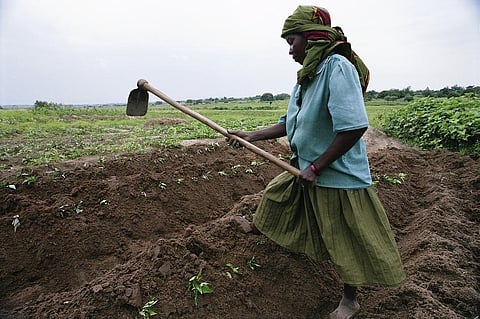

Africa is the second driest continent, with 40 per cent of its land affected by desertification. About 65 per cent of the farmland is affected by erosion-induced losses of topsoil and soil nutrients, making restoration difficult.
On top of this, less than 50 per cent of Africa's land is suitable for agriculture, and out of this, only 16 per cent is of high quality. As a result, 70 per cent population relies on the little available land to grow food and make a living.
This explains chronic food insecurity in the continent, which is home to 243 million undernourished people—one-fourth of the total undernourished people (815 million) in the world.
With an aim at increasing soil productivity in 47 African countries by 30 per cent, and reducing soil degradation by 25 per cent in the next 10 years, the United Nations' Food and Agriculture Organization (FAO) and its Global Soil Partnership has recently launched Afrisoils programme
Soil matters
"Healthy soil is the foundation of our food system - supporting healthy crops that nourish people," said Rene Castro, FAO's Assistant Director-General, Climate, Biodiversity, Land and Water Department. "Only with sustainable soil management can we achieve agricultural growth, ensure food security and adapt to a changing climate."
Many African countries lack policies regulating soil as well as the capacity, knowledge and experience to plan and implement sustainable soil management programmes. As a matter of fact, Africa’s Total Factor Productivity growth, especially in the sub-Sahara region, does not match up tot he growth of other developing regions over two decades. The region was lagging in the 1990s and fell even farther behind in the 2000s.
Over the past four decades, growth in Cereal yields in Africa barely doubled, while tripling in South Asia and increasing around six fold in East Asia and the Pacific.
"To render soils highly fertile and in the long term, we need to implement sustainable soil management practices that are of integral nature. We can't rely only on mineral fertilisers—a common practice around the world—as soil fertility or soil health depends on how we boost the soil system. We need to use smart, long-term solutions that increase soil productivity while safeguarding ecosystem services, and preventing pollution and degradation," says Ronald Vargas, FAO Land and Water Officer.
Some of the planned interventions
Besides implementing soil conservation and erosion control measures such as hedgerows, contour lines and terracing, the programme will also focus on increasing soil's organic carbon and organic matter.
Importantly, the programme will support creation of legislation and policy guidelines for sustainable soil management, apart from building farmers' capacity to use sustainable soil management practices and rehabilitating degraded soils. Establishing soil testing laboratories is also on the programme’s agenda.